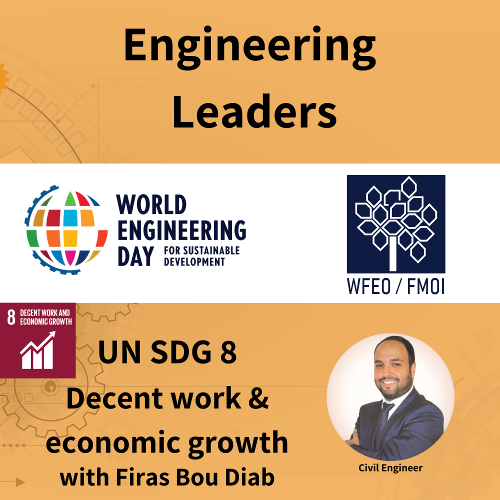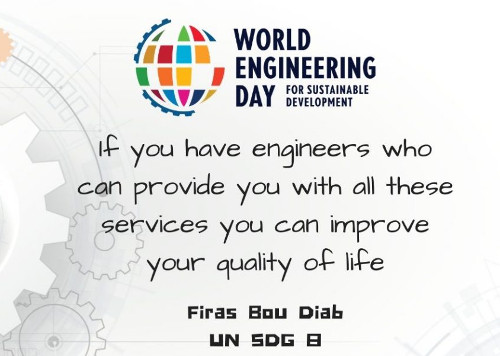See all the episodes of the Engineering Leaders Podcasts

This is a “close” copy of the words that were spoken in this episode
It is not 100% accurate.
The guest was Firas Bou Diab, Chair of the Committee on Young Engineers / Future Leaders (YE/FL).
Mel De Gioia 0:24
Welcome to Engineering Leaders Mini Series in the lead up to the very first World Engineering Day for Sustainable Development 2020. This mini series is being supported by the World Federation of Engineering Organisations. My name is Melanie and my co host and our podcast’s resident engineer is Dominic. Today’s episode is on the United Nations Sustainable Development Goal Number 8 – Decent Work and Economic Growth.
Dom 0:49
Our guest today is a civil engineer and currently works as a project manager and senior transportation engineer for a top global consultancy. In his role for the Order of Engineers and Architects in Beirut, Lebanon, he is involved with establishing the young engineers form that helps young engineers to transition smoothly into the labour market. Late last year, he was elected as a chairman of Young Engineers Future Leaders Committee at the World Federation of Engineering Organisations. Our guest today is Firas Bou Diab.
Mel De Gioia 1:23
Firas had a love for design and problem solving. As a young child he was drawn to be a doctor. However, he got into engineering and has been naturally drawn towards civil engineering. Firas says that being an engineer seemed like a smart idea. It had a very desirable career path. But engineering means more than just a stable career to Firas.
Guest 1:45
Engineers are the heart of the communities and they serve to improve these communities. Originally, I wanted to be part of that and to contribute for the better of the society and for the environment.
 Mel De Gioia 1:58
Mel De Gioia 1:58
Today we’re talking about United Nations Sustainable Development Goal number 8, which is around decent work and economic growth. Can you tell us a little bit about this particular goal?
Guest 2:10
Yeah, absolutely. We can say that all SDG’s aim to encourage sustained economic growth. That would happen by achieving higher levels of productivity and applying innovation. If we go directly to goal number 8, you can say that goal number 8 mainly is to promote sustained, inclusive and sustainable economic growth, full of productive employment and decent work for all. We can say that SDG 8 is about full employment and fair compensation. It’s about a minimum of 7% annual growth of the economies. Specifically, in the least developed countries, it’s the end of forced labour and slavery. SDG 8 protects labour rights and promotes safe and secure working environments. It should promote skill building for youth empowerment. Finally, we can say that SDG 8 is about implementing policies to promote sustainable tourism. I believe if we go back to the engineering, engineers can play an important role in sustainable development. They really can play a very big role in the UN SDG goals, and specifically in SDG 8, because simply,
Dom 3:35
So, what was your inspiration in aligning yourself to UN SDG number 8?
Guest 3:42
First, SDGs resonate deeply with my personal values. I am keen to support the United Nations raise awareness of the goals in the minds of the wider public. Being now Chair of the Young Engineers Future Leaders Committee in the WFEO, this committee we specifically believe that promoting decent work is really important because decent work involves opportunities for work that are productive and deliver a fair income all young people, engineers or other than engineers are looking for income, for security in the workplace and social protection for their families, for better prospects of personal development. They’re looking for freedom in their work place. That’s why we do believe that all the UN Sustainable Development Goals are really important. And all organisations from different fields and mainly engineers need to work together throughout the national and international associations and throughout the companies, throughout their businesses, to promote these goals and reach for the agenda of 2030 in developing these goals. The inspiration was and anyone should not give up the change of start with every one of us. Every human of earth,even the indifferent, the laziest person among us is part of this solution. This really was my inspiration.
Mel De Gioia 5:09
You’re a civil engineer, how are you contributing to this goal of decent work and economic growth?
Guest 5:17
Being part of the WFEO, and being the chair of the Young Engineers Future Leaders, I see our role in this is divided into three parts. First of all, engineers as I said before they play a crucial role to transform a plan to real action. We have a big role in influencing the success or the failure for these UN goals. First of all, the WFEO, since 2015, in inspiring, in engaging professionals on how engineering contributes to sustainable development, we have been engaging with leaders on the need for training and work placements for young engineers. We are supporting engineers with the skills and evidence to help create change. And we always believe that we need to act to translate the SDGs into an engineering specific plan on how we as a profession can reach these goals. If I’ll put it in a in a simpler way, we tried in 2017/18/19 and we’ll continue trying to work on the awareness, we need to raise awareness. And by running advocacy campaigns, we aim to reach young engineers and tutor them on the SDG 8, and its impact by 2030. You need to raise awareness on the younger peers. And we need to host events that can put the understanding on SDG number 8. These events in 2020 we’re looking to to have them as youth speaking forums in various locations around the world where we can engage young engineers to search for solutions on how to attribute on SDG 8. We’re finally thinking also in 2020, to take an action by creating volunteering opportunities locally and globally to enable contribution to a cause you believe in SDG 8. So we are working in parallel. This is not only the role or the work that the Young Engineers Future Leaders are working on, this is the strategy of WFEO. This institution is working on promoting all the goals, all the UN goals, and definitely we hope probably in the coming two years to create development orientation policies.
and the definitely to encourage the growth of small and medium enterprises. All these together will definitely promote for the best of SDG 8. We still have 10 years to 2030 and definitely every year we need to be working to attain and obtain new goals and new results in order to achieve our targets in 2030.
Dom 8:11
We’ve covered off quite a lot of goals there.
Guest 8:13
I need only to insist on something that
You know,
and figure out that at some point in time, several jobs will disappear and other jobs will come over.
Dom 8:49
You’ve probably answered this quite a bit, but are there any major goals that you hope to achieve for 2020 in regards to UN SDG 8?
Guest 8:59
To achieve SDG 8, we will need to reach several ambitious goals. By 2030 we need to achieve full employment and decent work for all women and men, including young people and persons with disabilities as well as equal pay for equal work. This is really something big that needs to be achieved in 2030. You know that, if you think of it, the United Nations Goal 8 is basically to ensure a 7% growth rate in developing countries per year in the economy. And
These are plenty of things that we need to work on. I don’t say that all of these targets will be achieved in one year or in two years. It’s a way of living. We need to teach younger engineers, students are studying engineering in the university is that the SDG Goals are important that would attain sustained economic growth, and gives everyone a full and productive employment and decent work.
Dom 10:10
I think I think we’ve got everything that covers it all. Thank you so much for joining us.
Mel De Gioia 10:15
Thank you so much for joining us today.
Guest 10:16
It’s my pleasure. It’s my pleasure. I thank you. I really thank you very much.
Mel De Gioia 10:20
And thank you for tuning into Engineering Leaders as we prepare you for the first World Engineering Day on Sustainable Development, which is going to be held every fourth of March. We hope you’re enjoying our mini series which is brought to you with the support of the World Federation of Engineering Organisations. The best way for you to show your support for our show, is to tell people, either in person or write a review. Just spread the word. Seriously, it is that easy. We look forward to you and your friends joining us next time when we bring you another episode with one of our engineering champions.
Transcribed by https://otter.ai
Firas Bou Diab a civil engineer and currently works as a project manager and Senior Transportation Engineer for a top global consultancy.
In his role for the Order of Engineers and Architects in Beirut Lebanon, he is involved with establishing the “Young Engineers Form” that help young engineers to transition smoothly into the labor market.
And late last year, Firas was elected as a Chairman of Young Engineers / Future Leaders committee at the World Federation of Engineering Organizations.
